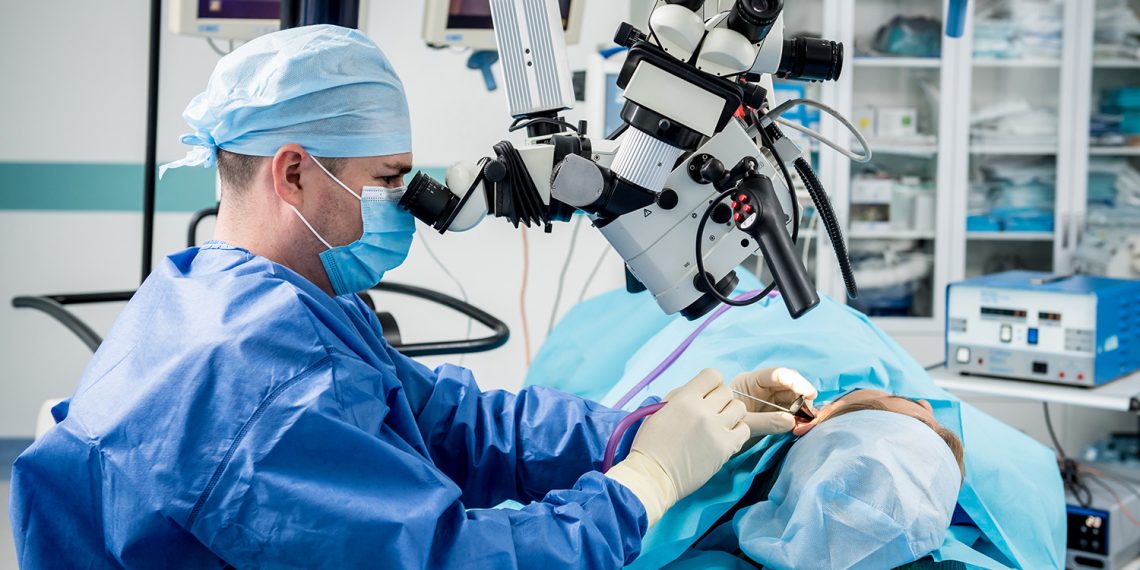Conductive hearing loss refers to a type of hearing impairment that occurs when there is a problem in the outer or middle ear that prevents sound from being properly conducted to the inner ear. Conductive hearing loss can be caused by various factors such as a blockage in the ear canal, a perforated eardrum, otosclerosis (a bony growth in the middle ear), or a problem with the bones in the middle ear.
Surgery for conductive hearing loss aims to correct the underlying problem that is causing the hearing loss. The type of surgery required will depend on the specific cause of the hearing loss.
Some common surgical procedures for conductive hearing loss include:
- Myringotomy – This procedure involves creating a small hole in the eardrum to relieve pressure from fluid buildup in the middle ear.
- Tympanoplasty – This procedure involves repairing a perforated eardrum. The surgery is performed under general anesthesia and involves the placement of a graft to cover the hole in the eardrum.
- Stapedectomy – This procedure is used to treat otosclerosis, a condition in which there is a bony growth in the middle ear that interferes with the normal movement of the bones involved in hearing. The procedure involves removing the affected bone and replacing it with a prosthesis.
- Mastoidectomy – This procedure involves removing part of the mastoid bone located behind the ear, which may be necessary if there is a chronic infection in the middle ear.
- Canalplasty – This procedure involves enlarging the ear canal to improve hearing. It is most commonly used to treat conductive hearing loss caused by a narrow or blocked ear canal.
Who is conductive hearing loss surgery suitable for?

Conductive hearing loss surgery is suitable for individuals who have been diagnosed with conductive hearing loss and are looking for a permanent solution to their hearing difficulties.
However, not everyone with conductive hearing loss will be a suitable candidate for surgery. The suitability of a patient for surgery will depend on various factors, including the cause and severity of the hearing loss, the overall health of the patient, and the patient’s age.
In general, patients with mild to moderate conductive hearing loss may be suitable for surgery, while those with severe hearing loss may not benefit as much from the procedure. Additionally, some underlying health conditions, such as a bleeding disorder or an active infection, may make surgery a less viable option.
It is important to consult with an experienced ear, nose, and throat (ENT) specialist or an audiologist to determine if conductive hearing loss surgery is suitable for you. Your specialist will consider your specific needs and circumstances and provide recommendations on the most appropriate course of treatment.
Conductive hearing loss surgery is suitable for individuals who have been diagnosed with conductive hearing loss and are seeking a permanent solution to their hearing difficulties. However, the suitability of a patient for surgery will depend on various factors, including the cause and severity of the hearing loss, overall health, and age. Consultation with an ENT specialist or audiologist is recommended to determine if conductive hearing loss surgery is right for you.
Conductive hearing loss is a type of hearing impairment that occurs when there is a problem in the outer or middle ear that prevents sound from being properly conducted to the inner ear. Conductive hearing loss can be caused by a variety of factors, including a blockage in the ear canal, a perforated eardrum, otosclerosis (a bony growth in the middle ear), or a problem with the bones in the middle ear. Conductive hearing loss can often be treated with surgery, but the recovery period following surgery can take several weeks or months. During this time, hearing aids can play an important role in helping individuals recover their hearing.
How can hearing aids help with recovery from conductive hearing loss surgery?

Assist in the healing process – Hearing aids can help support the healing process by reducing the strain on the ear and allowing for proper blood flow to the affected area. By using a hearing aid, patients can reduce the need to strain to hear, which can minimize the risk of further damage to the ear and promote faster healing.
Provide temporary relief – While waiting for the results of surgery to take effect, hearing aids can provide temporary relief for those with conductive hearing loss. Hearing aids can amplify sounds and help make communication easier for those with hearing difficulties.
Enhance speech clarity – Hearing aids can help enhance speech clarity, making it easier for individuals to understand what is being said. This can be particularly helpful for those who are recovering from conductive hearing loss surgery and may still be experiencing some hearing difficulties.
Improve overall hearing ability – Hearing aids can also improve overall hearing ability and can help individuals with conductive hearing loss to regain some of their lost hearing. By using a hearing aid, patients can gradually adjust to a new level of hearing and work to improve their listening skills.
Minimize the risk of further hearing loss – Conductive hearing loss can often progress to sensorineural hearing loss if left untreated. By using a hearing aid, patients can minimize the risk of further hearing loss and ensure that they receive the appropriate support they need while they recover from their surgery.
It is important to remember that while hearing aids can provide temporary relief for those with conductive hearing loss, they are not a permanent solution. The best way to regain full hearing after conductive hearing loss surgery is to follow the recommended course of treatment and wait for the results of the surgery to take effect. However, using a hearing aid during the recovery process can help make the transition easier and improve overall hearing ability.
Hearing aids can be an important tool for individuals recovering from conductive hearing loss surgery. They can help support the healing process, provide temporary relief, enhance speech clarity, improve overall hearing ability, and minimize the risk of further hearing loss. If you are recovering from conductive hearing loss surgery, consider using a hearing aid to help you on your journey to better hearing.




